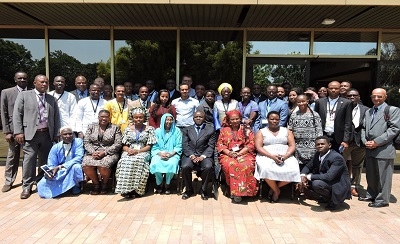
Harare, 26 Sept. 2017 (ACBF) – “Due to the influence of powerful groups with vested interest in the use of tobacco products, only knowledge and commitment on the ground will make Tobacco Control (TC) successful in Africa,” says the Director for Resource Mobilization, Strategic Planning and Partnerships at the African Capacity Building Foundation (ACBF) – Mr Bakary Kone.
Mr Kone, who spoke on behalf of the Executive Secretary of the Foundation, was addressing some 32 civil society stakeholders in Tobacco Control (TC) across Africa, at a five-day event in Harare to review the grounds covered in their advocacy work, midway through 2017, as well as imbue them with relevant skills and competences for resource mobilization, sustainability of the projects and institutional strengthening. The actors involved have since 2014 benefitted from TC grants from the Bill and Melinda Gates Foundation, fund-managed by ACBF.
“Tobacco use and its effects are clearly a public health issue,” Mr Kone argued, adding that “it has a clear impact on Africa’s ability to deliver on its development plan, notably the African Union’s Agenda 2063 as well as the global Sustainable Development Goals,” pointing to the need to intensify and expand the scope of tobacco control in Africa, seen as the next major destination for the tobacco industry as it faces widespread and more cocercitive policies on other continents
Figures from the World Health Organization (WHO) show that smoking kills more than 7 million people every year and costs households and governments over US$ 1.4 trillion through healthcare expenditure and lost productivity. Though only 2% of cigarettes smoked globally are in Africa, 6% of smokers live in Africa. Despite Africa having the lowest smoking prevalence in the world, the continent presents the greatest threat in terms of future growth in smoking. Currently, over 77 million adults smoke in Africa. This figure is expected to grow steadily over the next century, reaching 413 million smokers by 2100. Particularly worrying is the projection that by 2030 the number of smokers in Africa is anticipated to rise by nearly 40% from 2010 levels.
To stem this from becoming reality, ACBF has judiciously managed the Bill and Melinda Gates Foundation grants since 2014 to fund civil society groups that have, in turn, worked with governments, vested interests, as well as society at large to push for satisfactory tobacco regulations. The latest success story of this groundwork has been the recent adoption of the Parliament of Benin of a strong tobacco control law. Passed last 14 September, the law is a combination of strict control measures on the production, packaging, labelling, sale and use of tobacco, and tobacco-related products in the country. Such measures include a mandatory warning on the huge dangers of smoking on at 75 percent of the main side of cigarette packs, a total blackout on cigarette advertising and ban on smoking in public places.
The Initiative for Education and Control of Smoking (IECT, in French), a Beninese organization, which worked closely with the country’s Government since 2011 to make the law finally go through, thanks to funding from ACBF under the Gates Foundation grant, was represented at the Harare meeting by its very fulfilled Director Mr Augustin Faton.
“The passing of this law makes me feel very useful to my country,” an excited Mr Faton told the meeting’s other participants.
“Our collaboration with ACBF has been extremely cardinal for this achievement,” he added.
The Beninese example galvanized other stakeholders in the hall who said they believed such success would be recorded elsewhere with consistent and diligent work on tobacco control, as Mr Kone from ACBF had argued at the very beginning of the event.
-ENDS HERE-
For more information, please contact:
Abel Akara Ticha – Senior Communication Officer
The African Capacity Building Foundation
Harare, Zimbabwe
+263 7+263-4 304663, 304622, 332002, 332014; Ext. 279
Email: [email protected]
ABOUT the African Capacity Building Foundation (ACBF)
Having spearheaded and robustly coordinated capacity development programs worth over 700 million US dollars across 45 countries and 8 regional economic communities (RECs) in Africa since 1991, ACBF has gathered the requisite experience that makes it the go-to institution for expert knowledge and human resources to advise and support African countries, regional economic communities and institutions on decisive steps to take to develop the practical skills urgently required for the continent’s economic transformation.
Evidence from our cutting-edge work (constituting hundreds of knowledge publications) and the work of several partners show that Africa's development efforts are being hobbled by severe capacity deficits often in the form of shortage of critical skills, deficits in leadership, inhibiting mindsets and weak institutions. The continent’s practical skills shortage is acute in key areas such as Science, Technology, Engineering and Mathematics (STEM) and Agriculture.
At ACBF, we will continue using our unmatched track record in managing financial facilities for development, our vast knowledge gathering experience thanks to the exceptional skills mix of our core staff as well as our strong strategic partnerships and networks to help countries and institutions identify their capacity needs, advise them on how to plug these capacity weaknesses and on where to find the knowledge and resources to develop the requisite capacity resources, effectively use them and retain them to achieve their short and long-term development objectives.
ACBF’s vision is an Africa capable of achieving its own development.
Support this crucial work
Leverage your own efforts geared towards Africa’s transformation, or
Partner with us by writing to:
[email protected] (to support us with resources for Africa’s Capacity Development)





